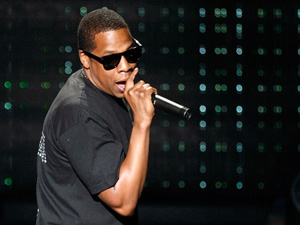
NPR has a great story by Mark Lynch linking hip-hop drama to international diplomacy and intrigue. The short version linked above really doesn't do the intricacies of the argument justice, take a look at the full article from NPR's foreign policy opinion section. FTA (block quote warning!):
See, Jay-Z (Shawn Carter) is the closest thing to a hegemon which the rap world has known for a long time. He's #1 on the Forbes list of the top earning rappers. He has an unimpeachable reputation, both artistic and commercial, and has produced some of the all-time best (and best-selling) hip hop albums including standouts Reasonable Doubt, The Blueprint and the Black Album. He spent several successful years as the CEO of Def Jam Records before buying out his contract a few months ago to release his new album on his own label. And he's got Beyonce. Nobody, but nobody, in the hip hop world has his combination of hard power and soft power. If there be hegemony, then this is it. Heck, when he tried to retire after the Black Album, he found himself dragged back into the game (shades of America's inward turn during the Clinton years?).And again:
The changes in Jay-Z's approach over the years suggest that he recognizes the realist and liberal logic... but is sorely tempted by the neo-conservative impulse. Back when he was younger, Jay-Z was a merciless, ruthless killer in the "beefs" which define hip hop politics. He never would have gotten to the top without that. But since then he's changed his style and has instead largely chosen to stand above the fray. As Jay-Z got older and more powerful, the marginal benefits of such battles declined and the costs increased even as the number of would-be rivals escalated. Just as the U.S. attracts resentment and rhetorical anti-Americanism simply by virtue of being on top, so did Jay-Z attract a disproportionate number of attackers.And more specifically, regarding Jay-Z's feud with Nas:
Nas opted to settle the beef, reconcile, and sign on with Def Jam Records — where he became one of Jay's leading and most valuable artists. In a world of unipolarity, both win through co-optation, reconciliation between enemies, and the demonstration that the gains of cooperation outweigh the gains of resistance.The analysis is really incredible, and it brings out a side of the rap world that we don't usually get to see. I love to see articles bringing out the smarter side of the entertainment world- that it's not just a bunch of self-absorbed, insipid shells of people making noises pretending to be music up in the limelight selling millions of albums. I like to think that these people are much smarter than they seem, and that their personas are carefully composed, from Lady Gaga to Jay-Z.
Check the article out-
Foreign Policy: Jay-Z Schools Us In U.S. Hegemony- NPR



nice raamin, y'know what music's on the top of my playlist! :~)
ReplyDelete